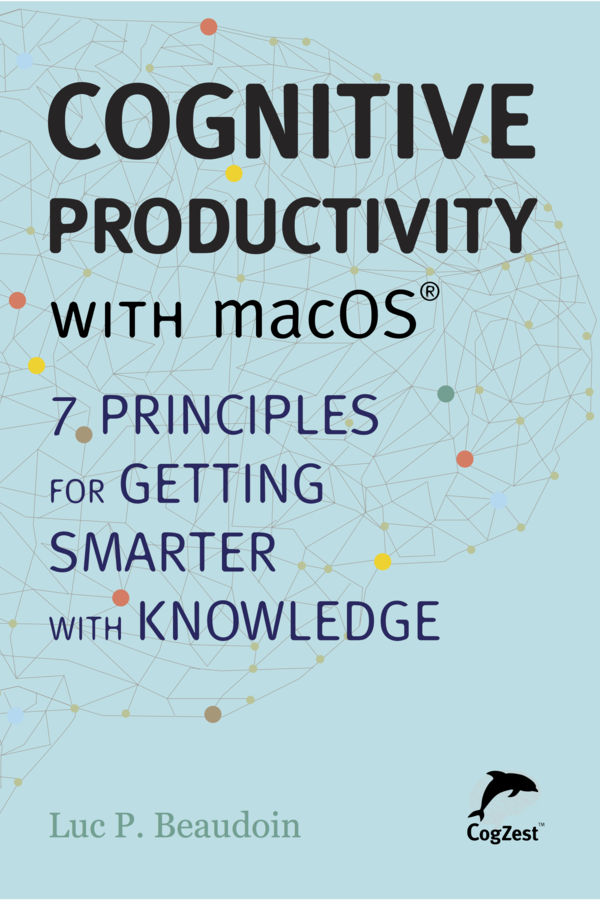You’ve heard me sing the praises of productive practice — a form of deliberate practice and test-enhanced learning that involves “retrieval practice”. I’ve released the latest installment of Cognitive Productivity with macOS®: 7 Principles for Getting Smarter with Knowledge, which includes Principle 6 “Practice Productively”.
Category: CogZest
Presenting on Wearable Health Technologies at Engage Heart + Lung Health FEST 2018
I will present on “wearables and their health value” at the 2018 “Engage Heart + Lung Health FEST”. I will focus on psychological contributors to health. This University of British Columbia-affiliated event will be held Feb 6-7, at Sheraton Vancouver (registration here). Continue reading Presenting on Wearable Health Technologies at Engage Heart + Lung Health FEST 2018
Reading with Software is Better than Paper: Principle 5, “Delve Deeply”, of Cognitive Productivity with macOS
Many people are still not convinced that software is better than paper for reading in depth. I believe this is largely because current software is, in fact, not designed for this purpose. It’s also that the majority of people haven’t figured out how to select and utilize e-reading software. One can shoehorn learning strategies on top of the best reading software.
I’ve dedicated much of my professional life since 2001 to understanding what it would take for people to be able to learn deeply by reading and practicing with software. I’ve been designing new software and strategies for learning with current software. Cognitive Productivity and Cognitive Productivity with macOS® demonstrate that learning with (the right) software is far better than with paper and pen —for that small minority of people who really wish to improve themselves with knowledge.
Last month, I published Assess Analytically, which is Principle 3 of Cognitive Productivity with macOS®®. That principle helps you identify knowledge resources that are worth processing in depth. Yesterday, I published Principle 5, “Delve Deeply”. That chapter contains tips for identifying, understanding and utilizing knowledge gems within helpful documents (and other types of resources). Continue reading Reading with Software is Better than Paper: Principle 5, “Delve Deeply”, of Cognitive Productivity with macOS
Cyber Monday 50% off Coupons for Cognitive Productivity Books
My two Cognitive Productivity books are on sale today for Cyber Monday. 50% off or more Continue reading Cyber Monday 50% off Coupons for Cognitive Productivity Books
How Do You Judge the Helpfulness of Information? And Why Does This Matter?
One of the few beneficial side-effects of the 2016 American federal elections, in which Donald Trump was elected President, is that thinking people are more aware than ever of threats to knowledge. Post-truth has entered dictionaries. We complain about fake news. We point fingers.
Assessing sources of information has always been one of the most difficult cognitive challenges thinking-people face. I discussed this topic at length in my first book. Yesterday, I published an additional chapter of my new book that deals extensively with this issue. It is the third of seven principles of Cognitive Productivity with macOS®: 7 Principles for Getting Smarter with Knowledge:
Assess Analytically
Continue reading How Do You Judge the Helpfulness of Information? And Why Does This Matter?
Response to Chad Grill’s Article “Reading Books Will Help You Build These 7 Habits”
In his article, “Reading Books Will Help You Build These 7 Habits” Chad Grills reminds us of the importance of reading great books.
I have to agree with Chad’s claim that “Books are the most undervalued and under-appreciated technology in the world.” Coincidentally, Continue reading Response to Chad Grill’s Article “Reading Books Will Help You Build These 7 Habits”
First Installment of Cognitive Productivity with macOS® Published on Leanpub!
I’m pleased to announce the publication of the first installment of Cognitive Productivity with macOS®: 7 Principles for Getting Smarter with Knowledge, which is now for sale on Leanpub!

This book is based on Part 3 of Cognitive Productivity. Whereas Cognitive Productivity contains only text and images, I’ve recorded over 70 screencasts for this new book. Continue reading First Installment of Cognitive Productivity with macOS® Published on Leanpub!
Don’t Be Discouraged by Peer Excellence: How Psychology and Cognitive Science Can Contribute to Cognitive Productivity
I’ve not talked a lot about perceived self-efficacy on this blog, and yet it is one of the most important pre-requisites for cognitive productivity, success and happiness.
I came across this article in one of my news feeds: Discouraged by Peer Excellence: Exposure to Exemplary Peer Performance Causes Quitting. I think we can all relate to this phenomenon. Everyone has experienced being around someone who is far more competent than himself or herself, and even than one can become with practice. My Cognitive Productivity framework is all about using knowledge to become more effective. Still, genetics and early experience do (differentially) place upper limits on everyone.
I clearly remember when, many years ago, I started working at Abatis Systems. I was the first employee. Continue reading Don’t Be Discouraged by Peer Excellence: How Psychology and Cognitive Science Can Contribute to Cognitive Productivity
Why So Quiet (Again)? 2017 Update and Some Thoughts about Engaging in Multiple Projects
This year, I have not been blogging as much as I had expected to. Here’s the background.
Work-Arounds to macOS 10.13 (High Sierra) PDF Rendering Problems (Skim)
Cognitive Productivity reader, Richard Holmes, notified me that macOS 10.13 (“High Sierra”) worsens the PDF rendering problems Apple introduced in macOS 10.12, Sierra, that I blogged about earlier. The problems are in Apple’s PDFKit used by third party developers. Apple seems to be using a private API to work around these problems in its Preview app and Safari. (In beta’s of macOS 10.13, however, Preview and Safari had PDF rendering issues.) Fortunately, Richard has discovered some work-arounds, which I describe below. That’s important, because, this issue aside, Skim is the most cognitively potent PDF reader for macOS.
Continue reading Work-Arounds to macOS 10.13 (High Sierra) PDF Rendering Problems (Skim)
